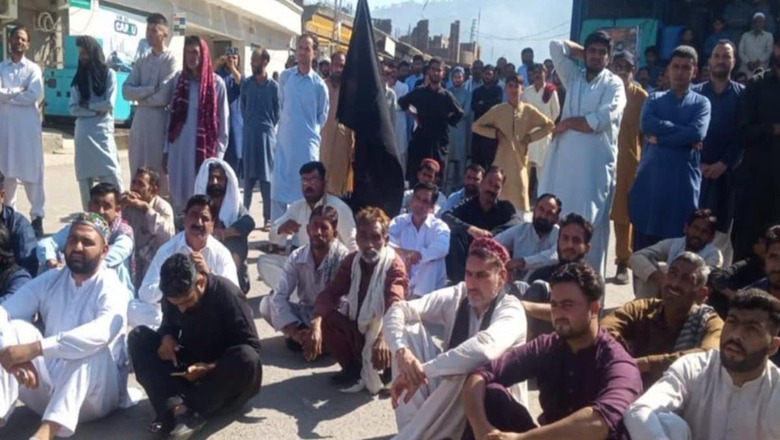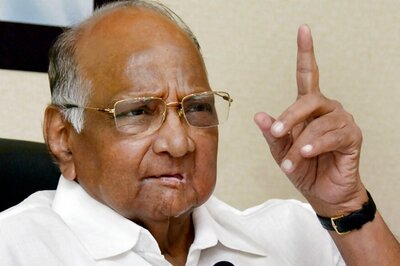
views
Last week, the Jammu Kashmir Joint Action Committee (JKJAAC) called for observing February 5 as a day of protest against heavy taxes on electricity bills. The announcement has been nothing short of a political volcanic eruption as every year since 1990, February 5 has been observed as Kashmir Solidarity Day. First, it was the Jammu Kashmir People’s National Party (JKPNP) which announced that it would support the February 5 general strike in Pakistan-occupied Jammu and Kashmir (PoJK). Then, the National Equality Party Jammu Kashmir Gilgit Baltistan and Ladakh (JKGBL) issued a statement in support of the strike as well.
Pakistan’s government and its puppet legislative assembly in PoJK has been using February 5 to galvanise hate against India and legitimise and muster public opinion to favour its proxy war in the Indian Union Territory of Jammu and Kashmir.
On February 5, a national holiday is observed and rallies are held in PoJK and the UK.
Kashmir Solidarity Day was first proposed in 1990 by Qazi Hussain Ahmed who was the leader of Jamaat-e-Islami, a far-right religious, fascist Islamic party. At the time, Nawaz Sharif was the Prime Minister who merrily approved of the protest day accompanied by a strike in PoJK. Hence, every year since 1990, a PoJK-wide strike has been observed on February 5 for the past 33 years.
Therefore, when JKJAAC called for a strike to be observed not as Kashmir Solidarity Day but as a day of protest against taxes imposed by Pakistan and cuts in subsidies of essential goods, it was nothing short of a political earthquake in PoJK and its occupier country Pakistan.
The ongoing civil disobedience movement that began on August 31, last year and has led to a historically successful ‘boycott electricity bill campaign’, has already cost the PoJK treasury more than Rs 3 billion. Meanwhile, Pakistan has unwaveringly been increasing the price of per unit electricity. Most recently, on January 7, an additional Rs 8.56 per unit has been added as sales tax.
Pakistan and its puppet government installed in PoJK has already made several attempts to sabotage the JKJAAC civil disobedience campaign. First, they used delaying tactics by inviting the 31-member strong JKJAAC central committee members for negotiations in anticipation that the movement would show signs of lethargy and wither away. Next, they tried to threaten and use blackmail tactics to break the will of the leaders of the movement. And now, when nothing worked, they have brought their team of saboteurs and goons to create confusion and scare among the second-tier leadership of the JKJAAC.
One such person is a non-state subject who arrived in PoJK 25-odd years ago after marrying a Kashmiri woman. His name is Abdul Razaq Khan and he was allegedly planted by Pakistan’s notorious spy agency, the ISI, among the traders association. Last year, he contested elections for the office of President of the Traders Association but was defeated by a nationalist Shaukat Nawaz Mir. Mir is leading the civil disobedience movement in most parts of PoJK. Razaq held negotiations with Pakistani officials in Islamabad and announced that all the demands of the JKJAAC, except the tariff on electricity bills, had been met. Everyone involved in the boycott movement smelled conspiracy and rightly so. After having lost the election for the office of the president of the Traders Association to Mir, Razaq set up a parallel traders organisation and joined the JKJAAC like a worm who creeps in through the cracks in the system. Once the JKJAAC had announced observing February 5 as a day of protest against Pakistan’s imposed taxes and cuts in subsidies, Razaq held a press conference accusing ‘some culprits’ among JKJAAC for ‘following Modi’s agenda’. Nothing could be far from the truth.
If one thing does not seem to be on Modi’s agenda, at least for the current term, is PoJK and G-B. The protest movement in both PoJK and G-B has, so far, not received a single word of support from the Indian government. How then can someone make such an accusation on those who are purely focused on fighting against taxes imposed on our people by Pakistan?
Another goon who recently issued a statement in media against the JKJAAC’s February 5 call for a strike is Saqib Majeed, the gang leader of the Muslim Students Federation alias motorcycle thief (Chorr). He has threatened violence against anyone who ‘dares’ to pull the shutters of their businesses down on February 5. As we get closer to February 5, competition as well as tensions between those supporting the strike as a day of protest against Pakistan or India will intensify. This is the first time in the recent history of occupation that a major protest movement is disassociating itself from Pakistan-sponsored anti-India propaganda and is using the oppressor’s tools of subjugation against them.
The question remains could the February 5 strike become a game changer? That can only be decided during the struggle between the forces of oppression and the dynamism of change.
Dr Amjad Ayub Mirza is an author and a broadcaster from Mirpur in PoJK. He currently lives in the UK. Views expressed in the above piece are personal and solely those of the author. They do not necessarily reflect News18’s views.




















Comments
0 comment